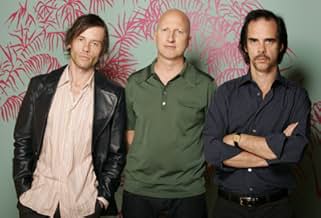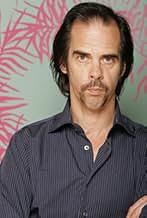Un hombre de ley captura a un proscrito y le da nueve días para matar a su hermano mayor, o ejecutarán a su hermano pequeño.Un hombre de ley captura a un proscrito y le da nueve días para matar a su hermano mayor, o ejecutarán a su hermano pequeño.Un hombre de ley captura a un proscrito y le da nueve días para matar a su hermano mayor, o ejecutarán a su hermano pequeño.
- Dirección
- Guionista
- Elenco
- Premios
- 14 premios ganados y 30 nominaciones en total
- Dirección
- Guionista
- Todo el elenco y el equipo
- Producción, taquilla y más en IMDbPro
Opiniones destacadas
The plot summary and the advertising seemed to offer some form of thriller but in reality the film delivers something altogether more interesting and memorable. Set in the Australia outback where settlements are being born and laws being established, the film charts the moral complexities of the good and bad in the story while painting a beautifully bleak backdrop of open space and bloody, pointless violence. It is not an easy film to watch and certainly not one to expect to come out of laughing or feeling good about things. Nor is it a film to go into expecting a traditional plot because it is this area where the film is at its weakest because it is not a "this happened, this happened then that happened" sort of story. This is not to say it is boring but it does require patience for the casual viewer. Personally I found most scenes to be interesting but most admit that the narrative kind of hangs around rather than moving forward firmly in one direction.
The substance is more in the characters than in the narrative and on this level it was engaging. Although the posters and summary will tell you this is about the Burns brothers, it is as much if not more about Stanley and his wife. It is he would has the duality of trying to defeat violence by encouraging it while also heaving under the burden of trying to take this job entirely on his own shoulders while protecting his wife from knowing anything about the real world out in the desert. It is an interesting thread and for my money it was the thrust of the story the issue of what Charlie will do is actually part of Stanley's story rather than the other way around. With this as the story the film is much better because it does paint a convincing tale around this. The Burns brothers thread is still interesting but less is done with it with Arthur himself being very little more than an enigmatic plot device.
Style wise the film is fantastic as it delivers a bleakly convincing picture of the birth of Australia. The landscape is beautifully filmed and, although Cave could have done more as writer, his contribution to the soundtrack is as welcome as it is well used. The sudden moments of violence are uncomfortable and difficult to watch. They are delivered in visceral moments of gore that are bereft of any touches that would glamorise the death; here it is horrible and full of flies. Of course you are right to note that a hauntingly stylish delivery should not be taken as a replacement for substance but I think it has just about enough of the latter and an abundance of the former to carry the film as a whole.
The cast are mixed but nobody really turns in a bad performance. Winstone dominates the film with easily the best performance and the most interesting character. His Captain Stanley wears every decision and Winstone allows us to see the effect this country has had on his soul. Watson is also good, simple at first but touched by the violence that her husband cannot defend her from. Pearce is an astute and subtle actor who keeps the audience with his thread even though it is less interesting; however Huston is not used as well as he deserved. He gives a memorable performance but his character is never more than an action waiting to happen. Wilson is convincingly young and his flogging is difficult to stomach, while Hurt turns up in a nice cameo as a bounty hunter. As much as the performances though, the film is about atmosphere, and Hillcoat has done a great job in producing a desolate film that is as beautiful as it is disheartening.
An imperfect film due to the lack of a strong narrative, this is still a memorable affair for many reasons. It looks great, has a great use of music and produces a haunting desolation in the country and the characters. Not a fun night out by any means but for what it is, it is well worth seeing.
You always know what you're going to get with a film by Australian director John Hillcoat namely strong memorable drama that's best viewed with a ready supply of anti-depressants . You also know what you're not going to get , laughs , mirth and a strong narrative drive . Certainly both GHOSTS OF THE CIVIL DEAD and THE ROAD suffered slightly from a lack of a strong narrative drive and in this British produced pseudo Western set in 19th Century Australia there's also a sign of this flaw from the director
The premise is one that grabs you and leads you to ask what you would do in that situation but as soon as Charlie leaves town on his quest the story meanders slightly as we're shown lots of panoramas of the Australian outback with a vague mystical air which will remind you of Australian cinema of the 1970s where the landscapes were the stars of the movie . One also gets the feeling in the first third that you're might be watching an Aussie version of APOCALYPSE NOW where a man with a mission involving extreme prejudice finds his target building an empire amongst the natives
This doesn't happen thankfully and after a slightly unfocused first 40 minutes the story gets back on track with characterisation coming to the fore . THE PROPOSITION is much more character driven than the premise promises . There is a slight cop out in that Mickey is the poor unintelligent younger brother who has merely tagged along with the gang through family peer pressure and while Arthur isn't portrayed by Danny Huston as a stock psychotic villain with staring eyes and manic laugh his actions do more than enough to convince the audience that this rabid criminal dog needs to be put out of his misery . The characterisation between the good younger brother and the violent bad older brother could been written and developed as a bit more grey but there again it might have made it more difficult to cheer on Charlie the middle brother played by Guy Pearce
The cast are excellent and special mention goes to Ray Winstone who is a national institution in Britain and watching him here you're aware of how underrated he is and gives a depth to Captain Stanley a man tormented by trying to uphold the law without giving in to rough justice from the locals . It's perhaps difficult to believe a rough working class bloke would be married to Emily Watson's rather middle class Martha but Watson does manage to project an innocence that seems out of place but that's undoubtedly the point . One character that did puzzle me was Jellon Lamb . John Hurt of course steals the show every scene he appears in but is there any point to the character except to spout Darwin ? it's a slightly confused and unnecessary character
And THE PROPOSITION is a slightly confused film that stops it from attaining true classic status . It's a bleak nihilistic character study from John Hillcoat and contains all the strengths and weaknesses from the director's prior and future work . That said it's much better than most of the films the UK Film Council insist on wasting their money on from the same period
At the opening credits Charlie and his younger brother the 14-year-old Mikey are captured after a bloody shoot out with regional Captain Stanley in the aftermath of a brutal rape and murder The decent captain is after their eldest brother Arthur described as 'the beast,' and is prepared to do just about anything to get him...
Thus Stanley lays out Charlie an unholy bargain: While Mikey stays in his custody, in jail, Charlie must find, kill or return Arthur or his teenaged brother will be hung on Christmas Day He has nine days to do so
Charlie eventually finds his brother but is left with one choice He must decide if he can live with his decision to either kill Arthur or let Mikey be executed
John Hillcoat's characters not only strike us with their emotions of grief and pain, or their passion of hate but they are presented in their real states that sway down hopelessness, denial, pity and firm belief
Pearce combines a touch of kindness to Charlie's character, but it's a touch that keeps out of the way any love It's, in essence, only enough to add a decisive influence on his personality that makes him unpredictable
Danny Huston is magnificent as Arthur Burns His deeply intelligence and totally brutal character is captured in a very good sense
Richard Wilson, Mikey is given little to do beyond being frightened and horrorized
Winstone is amazing in the role of the army officer who wants to civilize the place We feel how his nerves are about to break He imprisons his wife Martha for safety and protection caring at the same time about her delicate sensibilities
Emily Watson is absolutely stunning as the fragile woman whose gentleness captures convincingly the character of Emily, the innocent wife who cares about her husband, her house and her perfect "garden" but her way of life is so far away from the reality of her surroundings
John Hurt gives an interesting performance as the deranged bounty hunter
"The Proposition" is too violent, too dirty, too bloody, and too barbaric to be forgotten so easily
Directed by Brisbanite John Hillcoate from a script by Aussie indie icon Nick Cave, this film has some of the most gorgeous photography of the Australian outback ever committed to film, showcasing it's unique desolate beauty in it's dust, flies and exquisite sunsets.
Hillcoate assembles a very fine ensemble cast, most notably Ray Winstone as Captain Stanley and Guy Pearce as Charlie Burns - two actors performing at the top of their game. Danny Huston is effective as Arthur Burns, a man whose serene exterior belies his vicious temperament. Other performers include Emily Watson and John Hurt, as well as fine Australian talent David Wenham, Leah Purcell, Tommy Lewis and quintessential movie aborigine David Gulpilil. All performances are excellent.
Despite it's high violence quotient, the film has an admirable lack of moralistic tone. There are no obvious good guys and bad guys, all the characters are shades of grey possessing both positive and negative attributes, although some characters may lean one way or the other. In particular, Captain Stanley has a good heart though history may judge his methods of justice with contempt, and Charlie Burns has a fierce sense of loyalty and honour but his associated family ties have led him to commit horrific crimes. Even Captain Stanley's wife, Martha, in all her Victorian innocence and naivety, has a dark side to her soul; an attribute which will further propel all towards their destinies.
It's strong subtext of white colonialists' condescending treatment of the aboriginal population puts this film in fine company with other Australian indigenous-themed films such as Fred Schepisi's The Chant Of Jimmy Blacksmith, Nicholas Roeg's Walkabout, Rolf de Heer's The Tracker and Phillip Noyce's Rabbit Proof Fence. The Proposition is the best of these. This is a big call, I know, but the fact is that none of those other very fine Australian films possess the tension which so completely permeates Hillcoates' picture. This film represents a major achievement for both Hillcoate and Cave and is the best Australian film to leave these shores since Ray Lawrence's Lantana.
8.5 out of 10.
Slick. :cool:
¿Sabías que…?
- TriviaIn a 2018 interview, Guy Pearce said that this is his favorite of all of the movies he's ever done.
- ErroresAlthough the story takes place in the 1880s, Jellon sings "Danny Boy" - which wasn't published until 1913.
- Citas
Jellon Lamb: Forgive me, sir, but I've been stuck here with no one but this sorry sack of Hibernian pig shit for conversation. Poor, poor Dan O'Reilly. Sit, sir. Drink with me.
[Charlie cocks his gun and points it to Lamb]
Charlie Burns: One more crack about the Irish, Mr. Lamb, and I'll shoot you. Am I clear?
Jellon Lamb: Oh, as the waters of Ennis, sir. Let us drink, then, to the Irish. No finer race of men have ever... peeled a potato.
[Charlie cocks his gun again and points it to Lamb]
Charlie Burns: Do you pray, Mr. Lamb?
- Créditos curiososThe opening credits are shown first against a background of period photographs of Australia, which after a time become photographs of the actors/characters, locations and scenes in the film. The end credits are similarly displayed, but only period photographs are used. This is of special note in view of the noted disclaimer, since some indigenous aboriginal groups can be offended by such images.
- Bandas sonorasThere Is a Happy Land
(1850)
Traditional
Music by Leonard P. Breedlove (uncredited) (1850)
Words by Andrew Young (1838)
Arranged by Nick Cave and Warren Ellis
Selecciones populares
- How long is The Proposition?Con tecnología de Alexa
Detalles
Taquilla
- Presupuesto
- USD 20,000,000 (estimado)
- Total en EE. UU. y Canadá
- USD 1,903,434
- Fin de semana de estreno en EE. UU. y Canadá
- USD 32,681
- 7 may 2006
- Total a nivel mundial
- USD 5,048,893
- Tiempo de ejecución1 hora 44 minutos
- Color
- Mezcla de sonido
- Relación de aspecto
- 2.39 : 1
Contribuir a esta página








































